Yves GARY Hits: 5693
Category: 1870 : CHALLENGE N°1
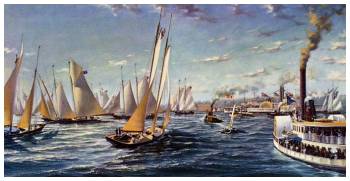 In a week's time both Dauntless and Cambria were ready for the race that was sailed on August 8th, 1870. Being the first race in American waters for the cup, throughout the country there was the greatest interest manifested in the result, — the public prayer being for any yacht to beat the representative of the Royal Thames Club, but best of all that it might be the America.
In a week's time both Dauntless and Cambria were ready for the race that was sailed on August 8th, 1870. Being the first race in American waters for the cup, throughout the country there was the greatest interest manifested in the result, — the public prayer being for any yacht to beat the representative of the Royal Thames Club, but best of all that it might be the America.
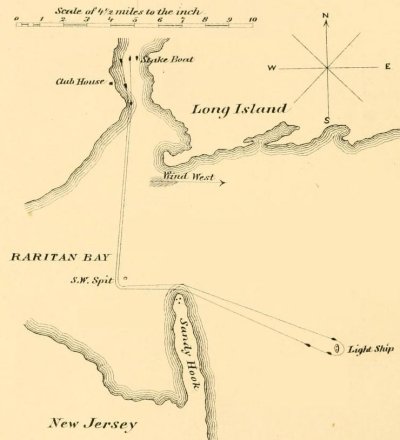 The course and conditions were those of the New York Yacht Club, and were admirably carried out. The yachts were ordered to proceed over a course from the anchorage to the buoy off the Southwest Spit, passing it to the west and south, and thence to the lightship (rounding it from the northward and eastward), and to return the same way, passing to the westward of the flag boat off the club-house, going and returning. All buoys on the West Bank — viz: Nos. 13, 11, and 9, — were to be passed to the eastward.
The course and conditions were those of the New York Yacht Club, and were admirably carried out. The yachts were ordered to proceed over a course from the anchorage to the buoy off the Southwest Spit, passing it to the west and south, and thence to the lightship (rounding it from the northward and eastward), and to return the same way, passing to the westward of the flag boat off the club-house, going and returning. All buoys on the West Bank — viz: Nos. 13, 11, and 9, — were to be passed to the eastward.
On the day of the race the flag boat was anchored abreast of the club-house, or about mid-channel, and the yachts were directed to anchor on an east and west line, 500 yards to the northward and westward of this, and about 50 yards apart. In taking position in line each yacht was allowed to select its own place, in the order of arrival at the anchorage, subject to any change which the executive committee might deem expedient, and mainsails, foresails and gaff-topsails were permitted to be set before starting, unless otherwise ordered.
"The day opened overcast and gloomy, and soon after daybreak heavy rain clouds brooded threateningly over the bay; but by nine o'clock the sky shone bright and clear, and a brisk and cheery southerly breeze blew bravely landward — so steady and true indeed, was this, that it hardly varied a point during the race, the official report stating that it was sailed with "a fresh breeze from south by east to south-southeast, in smooth water".
At five o'clock in the morning the tide was at full flood, thus giving the last of the ebb for the start with slack water at noon, and a strong three-knot flooding current to help the homeward coming of the fleet.
“It was emphatically a holiday; and though our lower bay had seen a grander array of contesting yachts in the regular regattas of the home club, yet never before w as there such a gathering of gleaming canvas or such an assemblage of representative crafts. For the fair fame of the country was at stake, and all classes of our citizens were assembled to greet the foreign yacht which had pluckily sailed 3000 miles of stormy sea to redeem a national defeat.
Then, too, they wished to honor and to greet our champions, whom ambition and duty had brought there to defend the ownership of the cup won 19 years before by that rakish schooner now waiting in the line of racers, trim and taut, and filling the largest measure of the nation's regard. Excursion boats over-shadowed every ripple of water not occupied by contestants, and in odd mixture there were assembled men-of-war, traders, fruiters and pleasure boats; there, too, were peaceful inland water craft, even up-river schooners and lumbering luggers, sharing in the general desire to be a part of the memorable yachting day.
| LES YACHTS The sun., August 09, 1870 |
||||
| Name | Entered by | Tonnage | Area | |
| 1 | Alice | Geo. W. Kidd | 83.3 | 1,425.1 |
| 2 | Cambria | James Ashbury | 227.5 | 2,105.8 |
| 3 | Tidal Wave | Wm. Voorhis | 153.5 | 1,879.0 |
| 4 | America | Admiral Porter | 178.5 | 2,074.8 |
| 5 | Madeline | Jacob Voorhis | 148.1 | 1,787.0 |
| 6 | Madgie | R. F. Loper | 131.2 | 2,031.9 |
| 7 | Phantom | H. G. & C.H. Stebbins | 123.3 | 2,063.4 |
| 8 | Rambler | J. H. Banker | 160.0 | 1,893.0 |
| 9 | Idler | Thos. C. Durant | 135.5 | 1,934.6 |
| 10 | Halcyon | Jas. R. Smith | 121.0 | 1,923.0 |
| 11 | Tarolinta | H. H. & H.A. Kout. Jr. | 204.7 | 2,121.7 |
| 12 | Dauntless | J. G. Bennett Jr. | 268.0 | 2,899.0 |
| 13 | Magic | Franklin Osgood | 97.2 | 1,640,0 |
| 14 | Sylvie | K. Dodge | 106.2 | 1,807.3 |
| 15 | Fleetwing | G. A. Osgood | 206.1 | 2,208.7 |
| 16 | Calypso | A. S. Hatch | 109.7 | 1,694.0 |
| 17 | Widgeon | C. C. Dodge & S. S. Haven | 195.9 | 1,616.0 |
| 18 | Alarm | A. C. Kingsland | 225.3 | 2,490.8 |
By 11 o'clock the gateway of the port was so blocked with vessels that it was impossible to get a view through the narrows, of the horizon seaward or of the blue Monmouth hills be3'ond; while on either hand not only were the banks crowded with a cheering multitude, but Forts Hamilton and Lafayette to the eastward, and Forts Wadsworth and Tompkins to the westward, had their ramparts and glacis (where there were glacis) packed with thousands.
At 11 o'clock the Middletown steamed down the line flying the burgee of the club and the private signal of the Dauntless, and it was evident that preparations were being made for the start.
Sailing against the visitor was the following fleet of yachts: The keel schooners Rambler, Dauntless, Fleetwing, America , Restless, Tarolinta, and Alarm, and the centerboarders Phantom, Madgie, Silvie, Tidal Wave, Madeleine, Idler, Magic, Palmer, Alice, Fleur de Lis, Era, Josephine, Calypso, Widgeon, Halcyon, and Jessie.
“The line was beautifully formed, the yachts being separated by an even distance of 50 yards, with their heads riding to the ebb, and pointing town ward. There were in all 18 starters out of the 25 entries, and of these the Alarm was at the extreme eastern end of the line, with Widgeon next, and so by the Silvie, Magic, Dauntless, Tarolinta, Halcyon, Madgie, Idler, Rambler, Phantom, Fleetwing, Madeleine, Calypso, America, Tidal Wave, and Cambria, to the Alice, which held the extreme western end. Choice of position had been granted the Cambria, and Mr. Ashbury had taken that nearest the club-house, and next but one to the shore.
" Public interest was mainly centered in the Dauntless, America, and Cambria, and before the start every steamer and passing sailing-craft accorded them the honors of a salute — too vociferous, too partisan, perhaps, at times, but still kindly meant, for the roughest of men are subdued by the influences of such a scene as this.
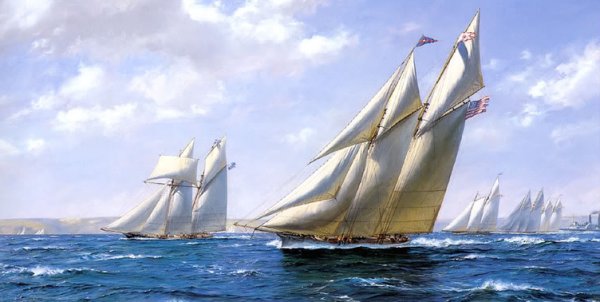 " At 26 minutes past 11, on the very last of the ebb, and with a fresh wind, the starting-gun roared its order to make sail and slip, and in a moment the yachts had spread their canvas, flattened their jibs, and then almost simultaneously turned seaward, the Magic, one of the smallest of the squadron, leading. The windward boats had the best of it, and as they flew towards the Hook, they quickly left the others behind; among these was the Cambria, for she had been nearly the last to get away. Through a dozen of the competitors rushed the America, and a rousing cheer rose as she flew, like a great seabird, to the forefront of the fight; but the Magic was the first out of the Narrows, with the Silvie next and then a half-dozen other Americans, all leaving the Cambria far behind, under Fort Richmond, and pointing for Coney Island.
" At 26 minutes past 11, on the very last of the ebb, and with a fresh wind, the starting-gun roared its order to make sail and slip, and in a moment the yachts had spread their canvas, flattened their jibs, and then almost simultaneously turned seaward, the Magic, one of the smallest of the squadron, leading. The windward boats had the best of it, and as they flew towards the Hook, they quickly left the others behind; among these was the Cambria, for she had been nearly the last to get away. Through a dozen of the competitors rushed the America, and a rousing cheer rose as she flew, like a great seabird, to the forefront of the fight; but the Magic was the first out of the Narrows, with the Silvie next and then a half-dozen other Americans, all leaving the Cambria far behind, under Fort Richmond, and pointing for Coney Island.
“Off the lower quarantine the America, a short half-mile astern of the Magic, was rushing for a commanding position; the Silvia, as if anxious to soothe the remembrance of that year when in England, with a defiant pennant at her masthead she was left unchallenged, was second, holding the Idler in her wake, and followed by the Phantom and the Dauntless, coming up hand over hand. Few of die yachts carried their gaff-topsails until near the Southwest Spit, the Magic keeping the lead, and rolling off knot after knot with a bone in her teeth and a furrow of foam astern, and standing up to her work under lower sails and all three jibs.
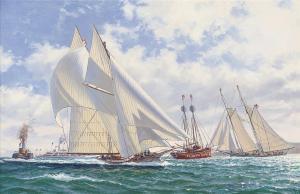 Soon after she set her main-gaff-topsail and a staysail, which like a Japanese wrestler, gleamed and tugged on her forecastle, and in a moment, it seemed, she wheeled round the Southwest Spit, with the America second, and only four minutes behind; the Idler was third, 50 seconds later; and almost together, the Silvie, Phantom, and Dauntless followed. Nineteen minutes later, and tenth in number, the Cambria rounded the Spit; and then with lifted sheets, away they all rushed for the lightship off the Hook.
Soon after she set her main-gaff-topsail and a staysail, which like a Japanese wrestler, gleamed and tugged on her forecastle, and in a moment, it seemed, she wheeled round the Southwest Spit, with the America second, and only four minutes behind; the Idler was third, 50 seconds later; and almost together, the Silvie, Phantom, and Dauntless followed. Nineteen minutes later, and tenth in number, the Cambria rounded the Spit; and then with lifted sheets, away they all rushed for the lightship off the Hook.
"As the yachts neared this, thousands of waiting spectators gave them a most enthusiastic reception — guns roared, men cheered, bells rang, and bands burst into loud and brazen notes of triumph; and when the Magic rounded the lightship, making it almost a certainty that the cup was safe, there arose a shout painful in its intensity of delight, for it was the relieved outcome of pent-up excitement which had reached its culmination at this very point. Nor was the Cambria forgotten, for although hopelessly behind — or perhaps for that reason — the pluck of her owner was recognized, cheers, steam-whistles and guns drowning the awful accompaniment of vagrant musicians, who struck up, with undoubted vigor and against time, what they politely meant for 'God Save the Queen.'
“ In the run from the Southwest Spit to the lightship the Idler passed into the second place, the Dauntless into the third, and the America into the fourth, while the Magic added another five minutes three seconds to her lead upon the Cambria.

In this order they ran for home, the wind blowing so strong and so free that the yachts were fairly flying in widening pools of foam, making 12 knots, and stretching their ropeyarns to the breaking point. Off the turn of the Hook there came a sudden puff, and the fore-topmast of the Cambria went over the side — the only accident of the day, and unfortunately, where it was most to be regretted.
 "At two hours 48 minutes 55 seconds, the Magic rounded the Southwest Spit, followed by the Dauntless and Idler, which had changed places, and closely hugged by the America; 23 minutes later the Cambria went by the buoy, eighth in order and doing so well that the lead of the Magic was decreased almost a minute in the run. Spinning round the Spit the racers squared away for home, the Magic still ahead, but pressed hard and gallantly by the Dauntless; the Silvie ran bow and bow with the Madgie and the Phantom, while the veteran Fleetwing, with a roaring sea under his bows, and an echo of sea in his throbbing canvas, left behind him the famous sailors, the Halcyon, Tarolinta, and Madeleine, and pushed forward for an earnest trial with the Cambria.
"At two hours 48 minutes 55 seconds, the Magic rounded the Southwest Spit, followed by the Dauntless and Idler, which had changed places, and closely hugged by the America; 23 minutes later the Cambria went by the buoy, eighth in order and doing so well that the lead of the Magic was decreased almost a minute in the run. Spinning round the Spit the racers squared away for home, the Magic still ahead, but pressed hard and gallantly by the Dauntless; the Silvie ran bow and bow with the Madgie and the Phantom, while the veteran Fleetwing, with a roaring sea under his bows, and an echo of sea in his throbbing canvas, left behind him the famous sailors, the Halcyon, Tarolinta, and Madeleine, and pushed forward for an earnest trial with the Cambria.
But the strength and beauty of the struggle was soon consummated by a glorious victory, for as the Magic rushed across the line it was not only in the fastest time ever made over the course, but, all things considered, with the greatest victory to her record ever won by a yacht since the world was young. Not that she had much time or distance to spare, however, for the echoes of the welcoming cheers were still lingering in the green hills of the bay when the stately Dauntless passed by the mark, carrying the reverberations of the nation's delight into a further and a greater echo; and as these cheers roared and rumbled in the distance, the harbor, to its farthest limits, caught up a newer and a greater paean of joy, for the America, fourth in the race, flew by the finish line, showing that as the sons were worthy of the sire, so were the brain and skill of old greater than story had told. . . .
“The Cambria arrived eighth on actual time (beaten all around, with and without handicaps) , and tenth in order by time allowance." An abstract of the official table of times for the race is presented herewith:
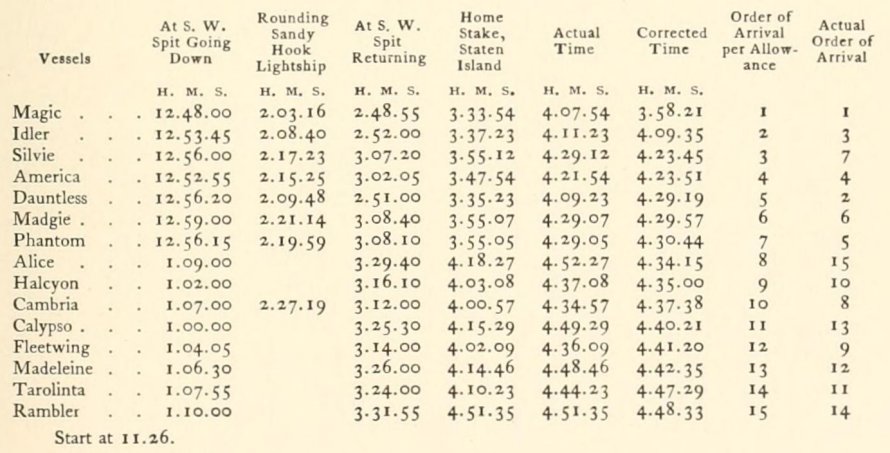
Thus the first attempt to lift the Cup failed, the faint-hearted and the doubters were silenced, and it was proved that we had not retrogressed in yacht designing and sailing, but could still hold our own with the best England could produce. The old America, finishing fourth in a fleet of newer boats, still beat the Cambria 13 minutes and 3 seconds, actual time. The practice, however, of racing a fleet against one boat is never one to be commended, is at best unfair and unsportsmanlike, and it is pleasant to chronicle that this was the last race in which a challenger was called upon to face these conditions.
